Swiss fail to break deadlock over EU bilaterals
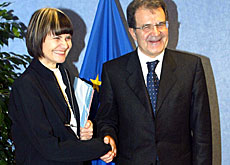
The Swiss foreign minister, Micheline Calmy-Rey, has refused to give ground on a second round of bilateral negotiations with the European Union.
But the European Commission also says it will not make any more concessions to Switzerland on the main sticking points.
Calmy-Rey met the European Commission president, Romano Prodi, and EU Commissioner, Chris Patten, in Brussels on Monday.
Patten said after the meeting that a number of thorny issues remained to be resolved, including closer security cooperation and tax fraud.
“We are working closely together, but there are still a number of sticking points,” he said. “I would hope solutions can be found… I think it is time to make progress.”
Switzerland is insisting that the second set of ten bilaterals is dealt with as one package, while the EU is in favour of a dossier-by-dossier approach.
Calmy-Rey said on Monday that Bern was prepared to take all the time necessary to reach a balanced agreement on all the dossiers, adding that “a strong nerve and a cool head” were what was needed.
She said Bern had given ground over the taxation of EU residents’ savings income held in Swiss bank accounts and was now waiting for Brussels to reciprocate.
“We are being generous and now we expect them to do the same,” she said.
Difference of opinion
Bern has yet to sign the agreement on taxing savings of EU residents in Switzerland, but Patten said he hoped this would be ratified by the end of the year.
“We also hope there is progress on tax fraud and on Schengen [cross-border crime], and we hope there won’t be any problems with the enlargement of European Union,” he added.
Last week, the cabinet announced that, given the current state of play with the bilaterals, EU membership would not be one of its policy targets for the next four years.
But it said it had no plans to withdraw Switzerland’s application to join the EU.
During her visit to Brussels, Calmy-Rey also met the EU foreign policy chief, Javier Solana.
Solana reiterated his support for the Swiss-backed Geneva Accord, an unofficial peace plan for the Middle East.
Dead end
Negotiations on Schengen are at a standstill because Switzerland wants an opt-out in the area of judicial cooperation. Bern fears that banking secrecy might be compromised by the exchange of information between police and justice authorities. But Brussels is refusing to budge.
“The EU is offering Switzerland exactly what it wants, to realise an agreement on the model of that concluded with Norway and Sweden,” said the Commission.
“Now, [Switzerland] is asking for an exception, which would create a dangerous precedent.”
Brussels is supported by most EU member states on the Schengen issue, with only Germany seeming willing to compromise with Switzerland.
Free movement
Another difficult area is the existing bilateral agreement on the free movement of people between Switzerland and the EU.
During the meeting, Calmy-Rey asked when this accord is to be extended to the ten new member states, which join the EU on May 1. She said after the meeting that the document was likely to make rapid progress.
The next round of discussions will take place on February 4 in Bern, when the EU is likely to press Switzerland to contribute financially to the EU’s enlargement process.
Bern has still not replied to the EU’s request for assistance and the latter estimates a contribution would be comparable to that of Norway – in the region of SFr335 million ($266 million) per year.
swissinfo, Barbara Speziali in Brussels
The first set of seven bilateral agreements governing labour, trade and transport agreements came into force in June 2002.
Switzerland is negotiating a second round of ten bilateral agreements including taxation of savings, prevention of fraud and education and professional training.
Schengen would lead to the scrapping of border controls between Switzerland and the EU.
It would provide common policies for fighting crime and a joint system of investigation and information.
The EU foreign policy chief, Javier Solana, reiterated his support on Monday for the Swiss-backed Geneva Accord, an unofficial peace plan for the Middle East.

In compliance with the JTI standards
More: SWI swissinfo.ch certified by the Journalism Trust Initiative
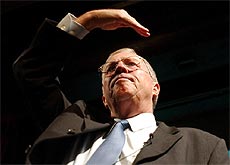
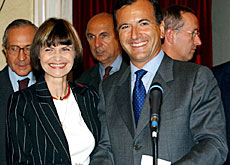
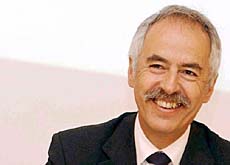
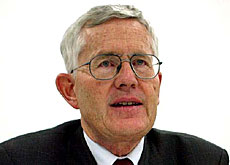
You can find an overview of ongoing debates with our journalists here. Please join us!
If you want to start a conversation about a topic raised in this article or want to report factual errors, email us at english@swissinfo.ch.